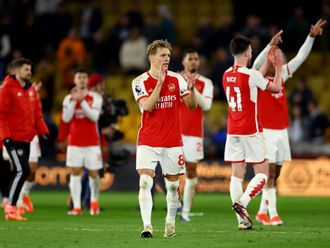London/Edinburgh: Scotland’s First Minister Nicola Sturgeon said on Wednesday that success for her Scottish National Party (SNP) in a snap election on June 8 would make it impossible for British Prime Minister Theresa May to stop a new referendum on Scottish independence.
Scotland voted against independence in 2014, but voted to remain in the European Union (EU) in 2016 while the UK as a whole voted to quit the bloc. Sturgeon says this means Scotland should have another chance to vote on secession.
“If the SNP wins this election in Scotland and the Tories [Conservatives] don’t, then Theresa May’s attempt to block our mandate to give the people of Scotland a choice over their own future when the time is right will crumble to dust,” Sturgeon told reporters in London.
The Scottish parliament last month backed Sturgeon’s bid to hold a new referendum in 2018 or 2019, but May rejected the proposal.
Polls suggest Scots do not believe the timing is right for another referendum, and although support for independence itself has been broadly steady at around 45 per cent or more, the SNP is predicted to win most Scottish seats in the snap poll.
May’s decision to push for a national ballot will exacerbate tensions within the historic union of England, Scotland, Northern Ireland and Wales.
Scots are disgruntled at the idea of a Brexit they rejected while Northern Ireland, which also voted to stick with the EU, is mired in a political crisis made tougher to resolve by the fray of campaigning.
“I don’t see that Scotland has featured in May’s calculations at all, and she has most certainly ignored Northern Ireland,” said Professor Michael Keating of the University of Aberdeen, adding May’s proposal could backfire in Scotland.
“The Prime Minister is seeking a UK-wide mandate for her version of Brexit. If the SNP get between 50 and 59 seats it will be difficult to deny that they have a Scottish mandate for their vision.” The SNP currently has 54 of Scotland’s 59 seats in the British parliament in Westminster. May’s Conservatives, which had their lowest share of vote in Scotland in a general election in 2015, have just one Scottish seat but hold an overall majority in the 650-seat House of Commons.
May told Sturgeon last month that now was “not the time” to discuss independence with Britain’s relationship with the EU in the balance.
But Sturgeon shot that argument back at May, pointing out that the prime minister was calling a national election despite having previously insisted it would be wrong for the country.
In the event they win seats from the SNP, the Conservatives are likely to seek to portray it as evidence that nationalists are losing momentum.
The Scottish Conservatives’ leader Ruth Davidson said in a newspaper column on Wednesday that having “traded successfully on a sense of momentum and inevitability” for years, the election would show the SNP was now “going downhill.” Davidson led the Conservatives to second place in 2016 Scottish parliament elections and many see her popularity as a fresh hope for the party in Scotland.












